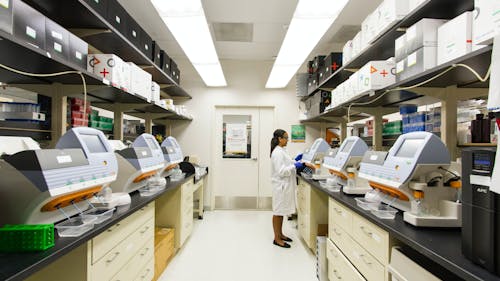U. researchers are studying additional factors that impact patient survival rates of pancreatic cancer

Researchers from the Rutgers Cancer Institute of New Jersey (CINJ) recently conducted a study on the newly discovered microbiome within pancreatic cancer tumors and found its association with worsened patient survival rates.
Bassel Ghaddar, a student at the Robert Wood Johnson Medical School, said cancer's development normally entails a mutation in the DNA that allows for the cells to grow uncontrollably, stopping the cells true function in its location, evading the immune system and spreading to other parts of the body.
Tumors live within an environment composed of immune cells, blood vessels and surrounding organ tissues that interact with cancer's progression, Ghaddar said. It was only recently discovered that other non-human microorganisms exist in that environment, too.
“There are also other components of the immediate environment,” he said. “Very recently, really in the past couple of years, a new member of this environment was discovered, and that is the prevalence of microbiome: the bacteria … it was surprising to find them.”
The study’s analysis of the bacteria as a component of cancer could inform researchers of their effect on its progression, Ghaddar said.
Additionally, regarding treatment, a goal is to identify the specific effects of the individual bacteria and therefore be able to further use any possible good bacteria that could hinder this type of cancer, Ghaddar said.
Ghaddar also said the project began when the researchers were able to use single-cell RNA sequencing technology to examine a piece of the tumor’s individual tissue and found both microbial sequences of RNA as well as the suspected human RNA.
Subhajyoti De, principal investigator at CINJ, said various factors can impact the environment of a tumor.
“The tumor's environment can also be occupied by a number of different microorganisms, and there might be complex interactions (that) happen between the tumor cells, microbes and immune cells,” De said. “That might have implications for how the tumor might grow.”
Ghaddar said the study applied the genetic sequencing technique on two cohorts of pancreatic tumors and found that about half the tumors contained microorganisms that function alongside the tumor cells.
In the patients who had these microorganisms, the tumors increased the activity of the inflammation pathways and triggered different immune processes compared to the tumors in the patients without the microorganisms, Ghaddar said. This finding suggests that the microbiome could lower patient survival and cause more aggressive pancreatic cancer.
While the full extent of what the microbiome is doing is still unknown, there are a few possibilities that are still being studied, Ghaddar said. The microorganisms and their signals could be used for early detection or other treatment options.
De said pancreatic cancer is one of the most deadly types of the disease as it is difficult to detect, and the use of immunotherapy is often ineffective. But the study introduces possibilities for why these treatments are not successful in patients and provides ways to address this issue.
“Both the pancreatic cancer-associated microbes and the specific nucleic acid signature might help with the diagnosis on one hand,” De said. “On the other hand, the role that the microbes play in the pancreatic cancer context might help us develop a new type of (drug) or make existing immunotherapy or existing treatment options more effective by using (a) combination of therapy.”
In looking to the future of the research, the study of treatment options stretches beyond pancreatic cancer to other cancers that might be more exposed to the body's environment, providing a greater microbial load to examine, De said.
“We continue to expand on this study,” De said. “We are actively recruiting the samples from the cancer patients to do much more systematic work, both in terms of the basic research and the discovery, identification of the biomarkers and also probably to track the patients and see how they respond to the treatment.”



